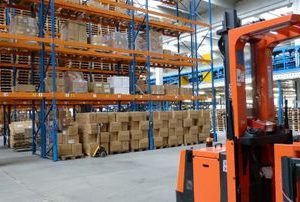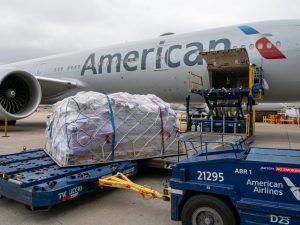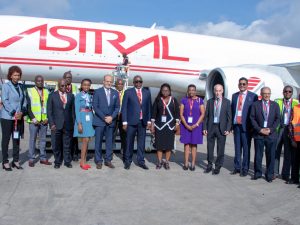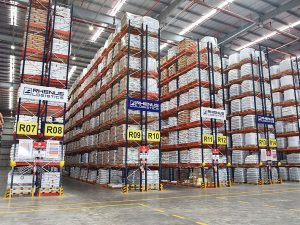Compliance is going to be the biggest factor to ensure safety, security and sovereignty of our nation. Compliance will come with a cost and inconvenience but its high time that trade should recognize that compliance is the key, says Samir J Shah, Partner, JBS Group of Companies. Indian exporters, importers, infrastructure developers and service providers should realise the more compliant we are, the more smoothly our cargo will move. In India, everything happens with Jugaad, tose days will soon be gone, we are seeing the change at lot of facilities which have either been stopped or being show cause as why it should not be stopped,” he adds. With so much amount of change and developments happening, the industry stakeholders are worried about their business continuity. The freight forwarding industry is the one which is going to remain because without cargo transportation, International business cannot happen. Yes, the challenges will change, the way we are working will change, what will happen is, the industry will become domain driven, which means each one of us will have to learn lot off new issues, legal issues, cultural and geographical issues and be in a situation to provide the efficient solutions which are quick, convenient and cost effective. So, the changes that are coming in through FTAs, technology evolution, trade facilitation agreements are pushing freight forwarders to do better, to send more cargo towards international borders. The industry should not worry about continuity, they should worry about adaptability, how they can change with the changing times.”
Read More »‘Govt must grant airports one year’s time to become RA3 compliant’
BCAS RA3 compliance is vital, no compromise with the cargo security, or theft, but govt. must grant at least one year’s time to these 11 AAICLAS operated airports, opines Cyrus Katgara, Partner, Jeena & Company. Cargo movement can’t be stopped. Govt. must facilitate EoDB, we can’t have cargo thefts, corruption or terrorism, therefore compliance is necessary but cargo movement should not suffer, things were going on smoothly earlier, no major incident happened in past many years. Our security is not bad at the moment. We surely need RA3 regulations, but business continuity is important too,” he adds. Katgara further comments on the burning issue which has become the bone of contention between the trade and the affected terminals. “We have to look at our Country first, what’s best for its welfare, then comes Exporters/ Importers, if their complaints, grievances are genuine then it must be solved too more effectively. I feel, the trade should not suffer, the airports should not loose its profitability, exports must not suffer. We follow India first policy. Closing down cargo movement at 11 AAICLAS operated airports due to its non compliance with BCAS RA3 regulations is affecting the trade and will take India backwards, instead of forward.”
Read More »ACAAI to host 47th annual convention in Kuala Lumpur from Nov23-26
The Air Cargo Agents Association of India (ACAAI) is all set to organise its 47th Annual Convention in Kuala Lumpur in Malaysia from November 23 to November 26, 2023. The Three-day convention will witness participation from air cargo industry experts including airports, airlines, freight forwarders, custom house agents, associations and end users. M Afzal Malbarwala, President confirmed, “This year’s Annual Convention will happen in Kuala Lumpur.”
Read More »FFFAI signs MoU to enhance customs trade with Japan
The Federation of Freight Forwarders’ Associations in India (FFFAI) and Japan Customs Brokers Association signed a Memorandum of Understanding Japan to promote customs trade between the two nations and resolve existing challengs related to customs and freight forwarding. The MoU also aims to strengthen trade relations between the two countries, EODB through digitalization and shared business opportunities. The MoU was signed on the occasion of FFFAI’s 60th Diamond Jubilee celebrations on June 9, 2023 at New Delhi with the theme ”FFFAI Transcending Boundaries”. The Union Minister of Commerce & Industry, Government of India Piyush Goyal graced the event as Chief Guest. The Keynote address was delivered by Vivek Johri , Chairman CBIC in presence of FFFAI EC Members (Customs Brokers/Freight Forwarders) and guest participants from logistics industry stakeholders.
Read More »ACAAI members discuss Global Cargo Issues at ongoing FAPAA AGM
The Air Cargo Agents Association of India – ACAAI is proud to be represented by Mr. Keshav Tanna and Mr. C K Govil at the ongoing 49th Executive Council Meeting of FAPAA happening in Bali from 8th to 10th June, 2023. This significant gathering brought together esteemed members from various associations across South Eastern Countries to engage in discussions on a wide range of cargo-related issues.
Read More »GMR divests warehouse facility at Hyderabad airport for Rs 188 crore
GMR group has divested its 8.18 lakh square feet warehousing facility at the Hyderabad Airport to ILP Core Ventures I PTE Limited for Rs 188.1 crore. GMR Hyderabad International Airport Limited (GHIAL), a step-down subsidiary of GMR Airports Infrastructure Limited, has signed the definitive agreements and closed the transaction with ILP Core Ventures I PTE Ltd, it said in a statement. ILP Core Ventures I PTE Ltd is a step-down subsidiary of Indospace Core PTE Ltd. This divestment of the warehousing facility was concluded by means of divestment of a 100 per cent equity stake of GMR Hyderabad Airport Assets Limited (GHAAL), a subsidiary of GHIAL and a special purpose vehicle (SPV) that owned this warehouse facility, the group said. Post the conclusion of the transactions, GHAAL would cease to be a subsidiary of GHIAL, it added. The resulting cash flows from the deal will help in deploying capital in expansion facilities and other growth opportunities at the Hyderabad Airport Land Development portfolio, the statement said.
Read More »Air cargo market witness rates falling by 40% in May
According to latest weekly market analysis by CLIVE Data Services, part of Xeneta, Tension is mounting in the global air cargo market heading into the weaker summer months with general airfreight rates falling in May by 40 per cent to their lowest level since March 2020 as restless airlines and freight forwarders went in search of volumes. The global airfreight spot rate fell 40 per cent in May from a year earlier, reaching its lowest level in over three years of $2.41 per kg, just days after IATA predicted airline cargo revenues and yields could fall by more than 31 and 29 percent respectively in 2023. Softening global air cargo demand saw a less severe year-over-year drop of -1 percent in chargeable weight in May, the smallest monthly decline in the past 12 months, but the influx of belly capacity for the peak summer leisure travel market applied more downward pressure on rates. Global air cargo capacity in May continued its double-digit increase, up 14 percent year-on-year. Less demand and more capacity led to an inevitable fall in dynamic loadfactor, CLIVE’s measurement of global volume and weight perspectives of cargo flown and capacity available. It was -5 percent pts lower vs. May 2022 at 55 percent.
Read More »Astral Aviation launches new freighter route to meet perishable demand
Kenya-based cargo airline Astral Aviation has launched a new freighter route from Nairobi to Tel Aviv. The scheduled route will be served by a Boeing 757 freighter and aims to cater for perishables demand. Chief executive, Sanjeev Gadhia said that the direct flight from Nairobi to Tel Aviv will reduce the transit time from 24 hours to five hours for Kenyan perishables, which previously were being routed via other hubs such as Istanbul, Addis Ababa, and Dubai. Gadhia added that return flights will enable exports from Israel to reach Africa via Astral’s Nairobi hub, strengthening the economic links between Kenya and Israel. The outbound flights will facilitate the efficient transportation of perishables, notably pineapples and vegetables. The initiative is also expected to facilitate mutually beneficial partnerships.
Read More »JAL begins A321 freighter conversions for April 2024 launch
Japan Airlines (JAL) has begun converting Airbus A321 aircraft into freighters for use on a domestic freighter network due to launch in April next year. Conversion of the first aircraft began on May 8 in Singapore and is expected to be completed by mid-September, said the Tokyo-headquartered airline. Another two A321s are also due for conversion. The conversions are being carried out by ST Engineering in Singapore under the management and supervision of ST Engineering’s joint venture with Airbus, Elbe Flugzeugwerke GmbH (EFW). Following the refurbishment process, the freighter will be transported on a ferry to Japan in late October. The second and third aircraft are currently parked in France, confirmed JAL. The domestic freighter network that the A321 passenger to freighter (P2F) conversions will be used on will be operated by JAL’s low-cost carrier unit, Spring Japan, in partnership with forwarder Yamato. Spring Japan will utilise the freighters to operate 21 flights a day on four key routes.
Read More »Indospace acquires 800k sq. ft. warehouse at Hyd Airport
IndoSpace Core has acquired the Amazon Fulfilment Centre in Hyderabad from GMR Group further expanding its pan-India portfolio. This is IndoSpace’s maiden acquisition in the city. With this investment, IndoSpace strengthens its regional presence and significantly expands its key tenant relationship. The acquisition which spans over 0.8 million square feet increases IndoSpace’s portfolio to approximately 58 million square feet of advanced logistics and industrial infrastructure across 51 parks in India. This asset in Hyderabad Airport City is strategically positioned near vital transportation hubs, ensuring convenient access to the airport, major highways, and railways and excellent connectivity to the city. The strategic location makes this facility the perfect choice for logistics operations. Rajesh Jaggi, Vice Chairman – Real Estate, Everstone Group, said, “We are thrilled to announce the extension of our presence into Hyderabad city with this acquisition in our IndoSpace Core portfolio. Hyderabad has established itself as a prominent market for logistics and real estate in India. This deal signifies another important milestone in our growth journey and underscores our unwavering commitment to offering world-class facilities to our valued clients.” IndoSpace continues to strategically evaluate attractive opportunities to expand its portfolio in key target markets across India.
Read More » Cargo Breaking News
Cargo Breaking News









